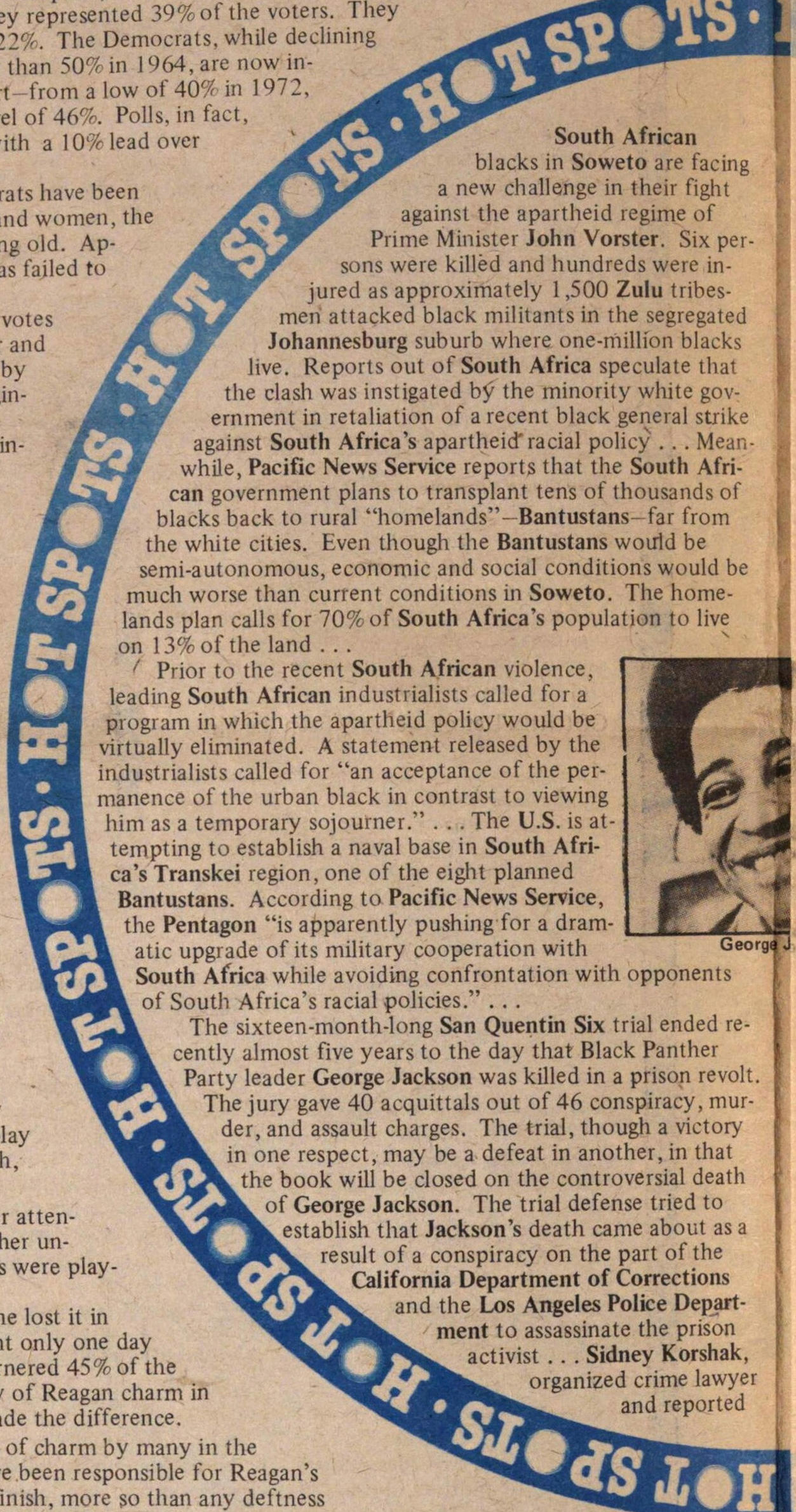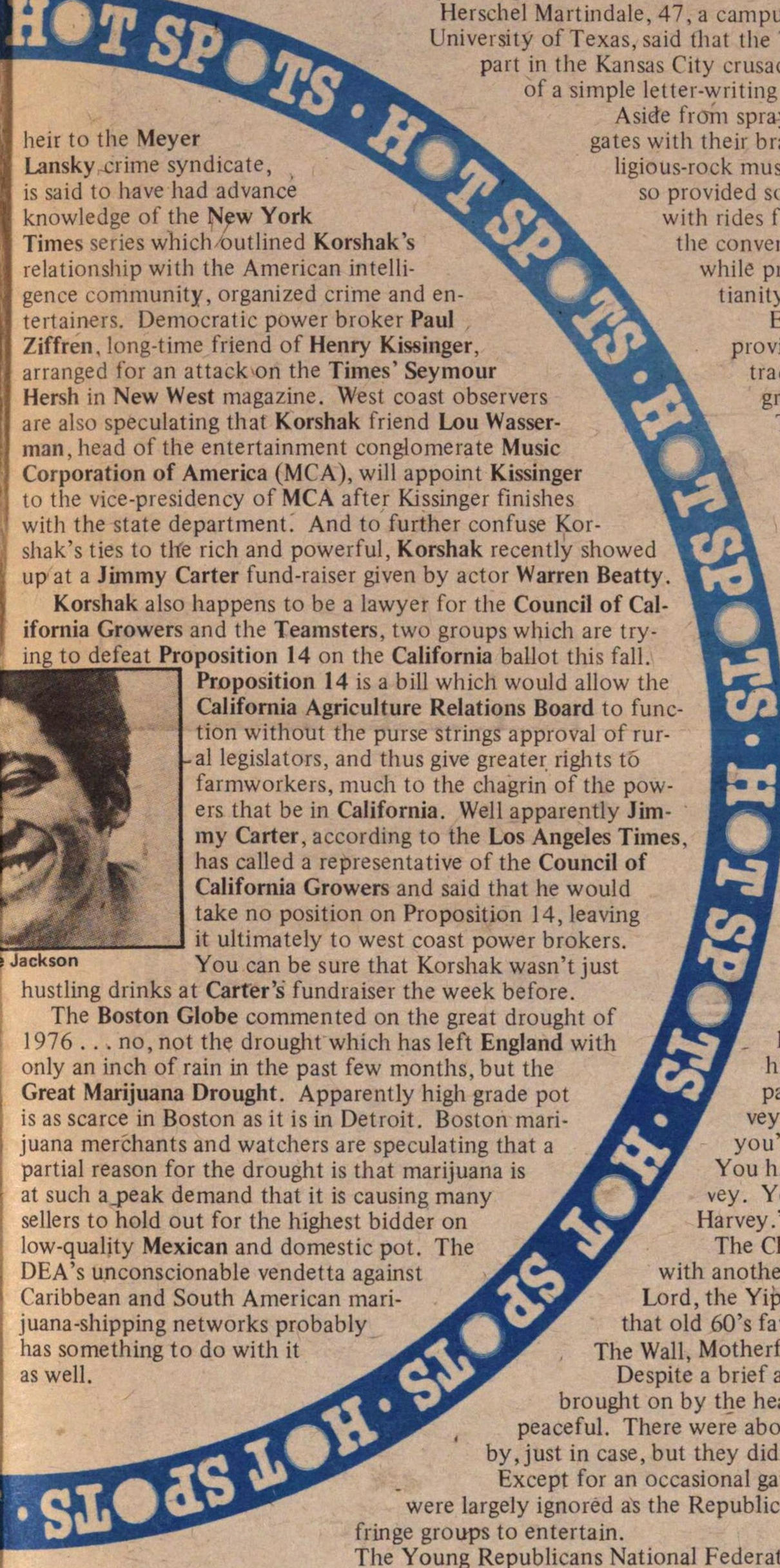HOT SPOTS


HOT SPOTS
South African blacks in Soweto are facing a new challenge in their fight against the apartheid regime of Prime Minister John Vorster. Six persons were killed and hundreds were injured as approximately 1,500 Zulu tribesmen attacked black militants in the segregated Johannesburg suburb where one-million blacks live. Reports out of South Africa speculate that the clash was instigated by the minority white government in retaliation of a recent black general strike against South Africa's apartheid racial policy . . . Meanwhile, Pacific News Service reports that the South African government plans to transplant tens of thousands of blacks back to rural "homelands" -- Bantustans -- far from the white cities. Even though the Bantustans wouid be semi-autonomous, economic and social conditions would be much worse than current conditions in Soweto. The homelands plan calls for 70% of South Africa 's population to live on 13% of the land . . .
Prior to the recent South African violence, leading South African industrialists called for a program in which the apartheid policy would be virtually eliminated. A statement released by the industrialists called for "an acceptance of the permanence of the urban black in contrast to viewing him as a temporary sojourner." . . . The U.S. is attempting to establish a naval base in South Africa's Transkei region, one of the eight planned Bantustans. According to Pacific News Service, the Pentagon "is apparently pushing for a dramatic upgrade of its military cooperation with South Africa while avoiding confrontation with opponents of South Africa's racial policies." . . .
The sixteen-month-long San Quentin Six trial ended recently almost five years to the day that Black Panther Party leader George Jackson was killed in a prison revolt. The jury gave 40 acquittals out of 46 conspiracy, murder, and assault charges. The trial, though a victory in one respect, may be a defeat in another, in that the book will be closed on the controversial death of George Jackson. The trial defense tried to establish that Jackson's death came about as a result of a conspiracy on the part of the California Department of Corrections and the Los Angeles Police Department to assassinate the prison activist . . . Sidney Korshak, organized crime lawyer and reported heir to the Meyer Lansky crime syndicate, is said to have had advance knowledge of the New York Times series which outlined Korshak's relationship with the American intelligence community, organized crime and entertainers. Democratic power broker Paul Ziffren, long-time friend of Henry Kissinger, arranged for an attack on the Times' Seymour Hersh in New West magazine. West coast observers are also speculating that Korshak friend Lou Wasserman, head of the entertainment conglomerate Music Corporation of America (MCA), will appoint Kissinger to the vice-presidency of MCA after Kissinger finishes with the state department. And to further confuse Korshak's ties to the rich and powerful, Korshak recently showed up at a Jimmy Carter fund-raiser given by actor Warren Beatty.
Korshak also happens to be a lawyer for the Council of California Growers and the Teamsters, two groups which are trying to defeat Proposition 14 on the California ballot this fall. Proposition 14 is a bill which would allow the California Agriculture Relations Board to function without the purse strings approval of rural legislators, and thus give greater rights to farmworkers, much to the chagrin of the powers that be in California. Well apparently Jimmy Carter, according to the Los Angeles Times, has called a representative of the Council of California Growers and said that he would take no position on Proposition 14, leaving it ultimately to west coast power brokers. You can be sure that Korshak wasn't just hustling drinks at Carter's fundraiser the week before.
The Boston Globe commented on the great drought of 1976 . . . no, not the drought which has left England with only an inch of rain in the past few months, but the Great Marijuana Drought. Apparently high grade pot is as scarce in Boston as it is in Detroit. Boston marijuana merchants and watchers are speculating that a partial reason for the drought is that marijuana is at such a peak demand that it is causing many sellers to hold out for the highest bidder on low-quality Mexican and domestic pot. The DEA's unconscionable vendetta against Caribbean and South American marijuana-shipping networks probably has something to do with it as well.
Photo caption: George Jackson
Article
Subjects
Freeing John Sinclair
Old News
Ann Arbor Sun